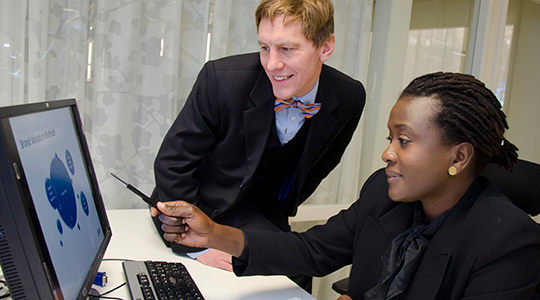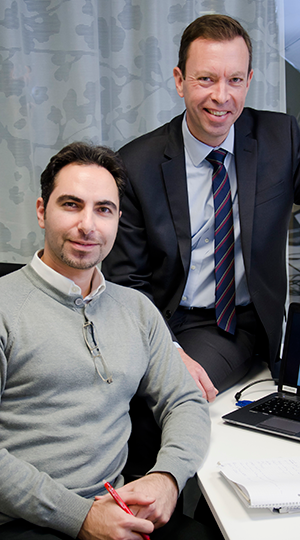SSAB offers training places to foreign-born graduates
“This is truly beneficial for all involved”, says Thomas Hörnfeldt, who heads a market development team focusing on market intelligence and solutions at the head office in Stockholm. “We get a lot of things done that we didn’t have time for previously and, in addition, we receive feedback and comments on our work from someone who is coming in with fresh eyes.”
“I hope that this will open new doors for me,” says Ameer Abdulal, who for the past three months has been a member of Thomas Hörnfeldt’s team, working on developing the process of compiling and analyzing information on how SSAB’s competitors operate on the market.
Business community initiative
The project, which is called Äntligen jobb (“A job at last”), is an initiative from the business community in Sweden aimed at providing foreign-born university graduates with an opportunity to enter the employment market. The project is being carried out in cooperation with the Swedish Public Employment Service, which bears all the costs. A number of different companies are participating and the entire program will be evaluated in the middle of next year.When Thomas Hörnfeldt was asked whether he could consider accepting a trainee, he discussed the matter with his work team. They identified a number of suitable tasks and notified the Public Employment Service of their “requirements profile” as regards a possible trainee. Five candidates were shortlisted and Thomas conducted customary interviews with them. Ameer Abdulal was ultimately chosen. He comes from Syria, has been in Sweden for almost 2 years, and possesses several years’ experience in PR and marketing work.
“I’ve applied for work at 40 different companies in Sweden, but no one has called me for an interview,” says Ameer. “I hope that things will be different when, after four months here, I’ll be able to produce a certificate from a Swedish industrial company. I want nothing else than to get a good job and begin paying taxes here, like everyone else.”
Ameer says that he’s happy at SSAB. He has most contact with his colleagues in the work team and finds it exciting with the multitude of different skills in the office. He’s also managed to visit Oxelösund and Borlänge.
“At the production sites, it felt as if everyone belongs to one big family,” says Ameer.
Thomas Hörnfeldt is pleased with his trainee and says that he would gladly recommend others to take in a trainee from this program.
“Ameer has given a push to a process which we wouldn’t have managed to achieve. When he finishes in a month’s time, we ourselves will be able to continue to work on these competition analyses. He’s also inspired us to become aware of the fact that we must focus to an even greater extent on markets in the Middle East and Africa.”
Juliet challenges SSAB
Daniel Moe has worked at SSAB for two years. He heads the work relating to the company’s intangible assets. Within business administration, the term ‛intangible assets’ (also called IP, Intellectual Properties) refers to non-physical property law assets, such as trademarks, patents, license rights and goodwill. He has obtained a trainee called Juliet Mphande, who began working at the office in Stockholm just a few weeks ago.

Juliet Mphande hails originally from Zambia and has been in Sweden for approximately 1 ½ years. Over the past 15 years she’s been engaged in both work and studies and is currently completing her master’s degree in marketing and strategic communication at a university in Scotland. Among other things, she’s been involved in business development at Toyota in South Africa and Japan, as well as working within the mining industry, banking and publicist work both in England and in Africa.
“My initial period here has been enjoyable; the atmosphere is relaxed, but nonetheless really efficient. People take care of their employees and speak in terms of a balance in working life,” says Juliet Mphande.
Juliet came to Sweden for personal reasons. Here, just like many others, she has come to learn how difficult it can be to get a foot in the door on the job market despite the fact that, as in her case, she has an impressive CV.
“I think that people are unaccustomed to seeing which qualifications different individuals actually possess; maybe people think that all immigrants are uneducated or lacking in experience. Being treated in this way can also result in actually making someone stronger and perhaps lead them to start their own business as a way of making a living. It’s also very important to have a good caseworker at the public employment service, one with a broad contact network and who sees the potential possessed by jobseekers.”
Juliet already has comments on the SSAB One management philosophy, since the principles are based on a philosophy with which she is familiar from her work at Toyota.
“Throughout the Toyota group, work truly is permeated by the “Lean management” philosophy, and it will be interesting to see how you address these issues here.”
Juliet will be staying at SSAB for four months and she hopes that it will be a mutually beneficial experience for her and the company. In the long term, she hopes to work with strategic projects that increase stakeholder value.
“I’m going to try to learn as much as possible. I’m also going to share my experiences and perhaps inspire others. I can see that there are many talented people here.”
Additional trainees can be accepted
Within the scope of this program, thus far six individuals have received training places at SSAB, in various parts of the organization.“At the same time as we are addressing integration issues in a concrete matter, this contributes to an increased diversity which is important for our success,” says Tor Bengtsson af Sillén, HR within SSAB Europe. “Many of the positive, committed individuals I’ve met over these months have possessed very impressive qualifications from universities and working life throughout the world.”
SSAB obtains access to their skills for a number of months, while the trainees receive a certificate showing what they have done at SSAB, which perhaps can help them advance in their career.
